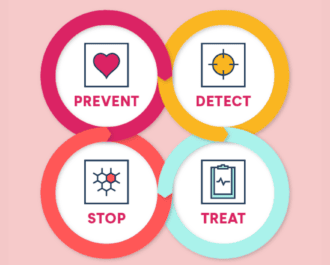
Researchers are looking for ways to help women improve their quality of life after surviving breast cancer.
It is estimated that up to 75 percent of women who have been treated for breast cancer may experience problems with cognitive function, such as trouble remembering things or focusing on a task. Although these difficulties might last for years after treatment there really aren’t many science-based options available to help.
“Whether or not they receive chemotherapy, many breast cancer survivors experience a decline in brain function that impacts memory, thinking and concentration,” said Professor Sheri Hartman from UC San Diego Moores Cancer Center.
“Survivors often report that their thinking is slower or feels more foggy. The brain just doesn’t work at the same level as before cancer treatment,” she said.
Research looks at exercise
 Professor Hartman’s recent pilot study of 87 female breast cancer survivors, published in the journal Cancer, investigated the impact that exercise might have on women’s mental abilities after breast cancer treatment.
Professor Hartman’s recent pilot study of 87 female breast cancer survivors, published in the journal Cancer, investigated the impact that exercise might have on women’s mental abilities after breast cancer treatment.
In a 12-week trial, half the women were enrolled in an exercise program tailored to each person’s interests and abilities and were given a Fitbit. The other half were assigned to a control group that received emails addressing women’s health topics, healthy eating, stress reduction and general brain health.
Doing exercise helps cognition
The women who participated in the exercise program experienced a significant improvement in cognitive processing speed, which measures how fast information can be taken in and used. Their improvement was double that of the control group.
These women also ended up exercising for about 14 more minutes per day than those in the control group.
“This study supports the idea that exercise could be a way to help improve cognition among breast cancer survivors,” says Professor Hartman.
More research is needed
While the tests evaluated several aspects of cognition, only speed processing showed a significant improvement. The researchers recommend larger and longer trials evaluating the necessary duration of exercise and intensity of activities to determine if increased exercise might impact other aspects of cognition.
“Breast cancer survivors have the highest rate of cognitive decline after treatments than any other types of cancer patients. We haven’t had a lot of good recommendations for them. But now we can say exercise looks like it works,” concluded Professor Hartman.
Exercise may also help women currently with breast cancer
The National Breast Cancer Foundation (NBCF) has a history of funding research that looks into the impact of exercise on reducing risk, enhancing recovery and contributing to quality of life for those affected by breast cancer.
Dr Brigid Lynch from the Cancer Council Victoria is currently funded by NBCF togather data using wearable technology on the impact of exercise on preventing breast cancer and how it can help women going through treatment cope better and make the treatment more effective.
In the long-term, Dr Lynch’s research will help to provide recommendations to the public health system on the type of exercise that is most beneficial for women with breast cancer.
More News Articles
View all News


